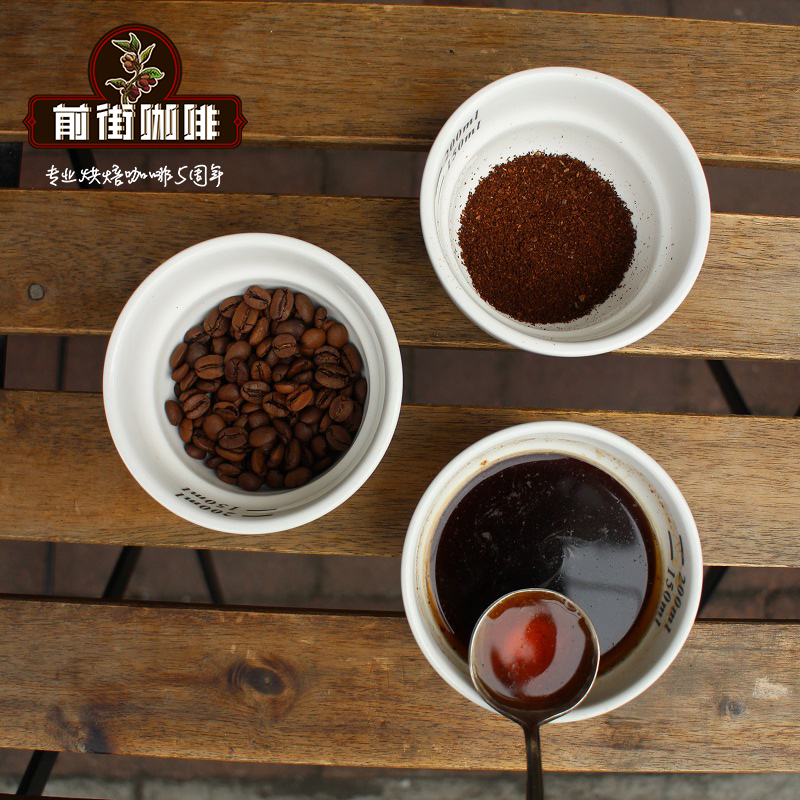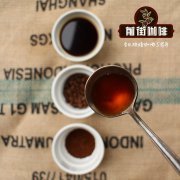Is Robusta's flavor worse than Arabica? can Robusta make hand coffee?

Is Arabica the only variety equated with taste and quality? Is Robusta always that bad?
At present, about 40% of the world's Robusta species, which grows faster than Arabica and is more resistant to extreme weather, but farmers do not pay equal attention to it when producing and dealing with it.
Because Robusta has a poor reputation for flavor, it is usually skipped by boutique coffee lovers. But if Robusta coffee is given as much attention to planting and handling, is it possible to turn it into delicious coffee?
Robusta vs Arabica
First of all, to make a clear distinction, when it comes to the flavor and aroma of coffee, Arabica is more complex than Robsta, in part because the chemical composition of the two varieties themselves are not quite the same.
In Espresso Coffee: The Science of Quality, the authors say Arabica coffee contains less caffeine, amino acids and chlorogenic acid but 60 per cent more total oil than Robusta. Chlorogenic acid will form astringent taste, so less chlorogenic acid in Arabica is beneficial to the development of coffee quality. Many aromatic volatile compounds are attached to oils and released during coffee brewing, so oils can explain the differences in flavor quality between Arabica coffee and robusta coffee, especially in espresso.
Robusta is usually disliked for its rubber and bitter taste, and this breed is high in caffeine. As a result, bean bakers and baristas of boutique coffee often ignore this kind of coffee, which is often circulated in the low-end market and used as a blend of formula beans.
The quality of coffee depends not only on the chemical properties of coffee beans, but also on a series of choices. The delicious Arabica coffee we drink today is not only a gift from nature, but also the result of centuries of emphasis on quality-related factors. Then people make the choice of production, post-processing, baking and brewing, each of which will further affect the sensory quality of coffee.
In the whole supply chain, people put more resources and time into Arabica coffee than Robusta, which has a great impact on the flavor of the final cup.
Coffee quality agency CQI claimed that "Robusta's cup test scores are usually not high, because the flavor quality is often not very good, which is directly related to the method of treatment." Robusta usually trades directly with a large number of defective beans, and cup testing is not a top priority for farmers. But what if it is handled properly? It may affect not only the production of farmers, but also other parts of the supply chain. "
Rethink Robusta
To be honest, if Robusta gets the same care and attention as Arabica, it may improve the cup test score and make people pay more attention to this breed. However, if there is no market demand for "quality Robusta", then farmers have no incentive to improve quality at the farm stage.
Some organizations try to change the market's negative association of Robusta and develop a good market for Robusta. CQI started the project of good Robusta in 2010 and issued the "Standards and protocols for good Robusta" in 2019.
Dr. Mario Fernandez, Technical Director of CQI, said in a speech on Coffee Podcast: "Robusta has certain characteristics that make it more attractive to some producers, bean bakers and consumers than Arabica coffee. Many people in the boutique coffee industry do not understand that it is wrong to compare Arabica and Robusta coffee in terms of quality. They are two species of the same genus, such as donkeys and horses. Donkeys and horses are valuable human resources, but they adapt to different jobs and serve different purposes. There is also land suitable for Arabica and land suitable for Robusta. "
The coffee industry sees more of the impact of climate change, and growing crops suitable for land conditions may become more and more important. As demand grows and more land becomes unsuitable for Arabica coffee, the coffee industry needs to look for alternatives. "without significant efforts to adapt coffee production to climate change, global coffee production may even be much lower by 2050 than it is today," Coffee Barometer said. "
Franziska Bringe is the purchasing manager of GEPA, a German coffee importer, working with the Robusta producer in Uganda. She told the author some of the benefits of Robusta.
She said: "in the original sense, Robusta is stronger, easier to grow and cheaper than Arabica coffee. Producers can grow it at a lower altitude than Arabica and are less vulnerable to diseases and insect pests because of their high caffeine content (natural insect repellent). "
Robusta is also more resistant to unstable climates and warm temperatures, which is controversial over climate change and production cuts in Arabica. Robusta's fruit also grows much faster than Arabica, which takes several years to mature, and the former has a higher yield per tree. Of course, the disadvantage is that it is cheaper than Arabica coffee. "
But low prices are another strong argument for premium robusta coffee and its place in the boutique coffee industry. Millions of farmers around the world grow robusta coffee, and the improvement in the quality of these coffees is likely to raise coffee prices and bring higher incomes.
As the boutique coffee industry claims, if the mission of the boutique coffee industry is to put producers first, it would be ethical to invest in Robusta to improve its quality and reputation.
How to improve the quality of Robusta?
Let's take a look at Robusta's general approach and what measures can be taken to improve its quality in all aspects of the supply chain.
Production & treatment
Stephan is a family of coffee farmers from Masala district in central Uganda, whose family Coffeeyouknow produces high-quality Robusta. "Robsta's bad reputation comes from farming, especially poor agricultural techniques that are processed after harvest," he said. "
"it starts with poor picking and incorrect storage," he told the author. "many farmers do not completely dry the coffee to a moisture content of 11-13%. All these bad practices will affect the final taste of coffee, making it sour, earthy, musty and so on. "
He said that the quality of Robusta's coffee can be improved through some simple measures, such as picking only ripe fruit, processing immediately, drying on scaffolding, and having a good storage environment.
Stephen said: "in essence, all the best techniques for handling Arabica coffee should be used, slightly adjusted for Robusta's treatment. Of course, the flavor will not be as rich as Arabica coffee, but it will probably get other flavors that many consumers and bean bakers have never tasted before. "
"if Robusta is properly handled and sun-dried raw beans can have a very clean coffee flavor, bright acidity and light taste," he said. "
Franziska tells the author how GEPA produces high-quality robusta coffee with a good taste.
"GEPA is working with the Ankole Coffee producers Cooperative Union (ACPCU)," she said. Continuous cup testing with producers and members of cooperatives has raised their awareness and quality of this kind of coffee. We have developed a high-quality Robusta that can be sold in the German market as a single-origin espresso. GEPA provides post-harvest technical, bean picking and grading training. When you handle coffee beans carefully, their quality will be astonishingly improved. "
"the treatment of this high-quality Robusta is different from that of the general Robusta, where farmers harvest the fruit and bring it to the cooperative within a few hours and dry it on a drying bed. Since this process is centrally managed by cooperatives, the quality is improved and the fruit can be evenly dried and properly ventilated. Then, the coffee beans are graded and screened using a color picker. "
Franziska said Robusta has great potential to improve the quality of coffee as long as it improves its technology during and after harvest. She also stressed that Ping Ping is Robusta, some for general commercial purposes, some depending on high-quality Robusta, and the differences are only different in terms of treatment.
Market demand and industry expectations
Stephen said: "without market demand, it is very difficult to implement agricultural-side improvements. One of the main reasons for this is the negative attitude towards Robusta. "
Imagine that the producers of Robusta use the best technology in every step, follow the best agricultural practices, and concentrate on investing in this coffee. Then a boutique coffee baker said: very good, thank you, very good, but this is still Robusta. We only use boutique coffee beans, and this can only be Arabica. "
"so far, even exporters of origin have rejected Robusta because the industry only considers Arabica coffee," Stephen said. You can't blame growers for not investing in crop improvements, but because their beans will never get into the boutique field, although he may be able to make more money in the boutique field. "
Mamy Dioubat é is a doctoral researcher in international political economics dedicated to the global price chain of crops. "I don't think Robusta's market can compete with Arabica's boutique market," he said. "
"improving the quality of Robusta does not mean putting additional pressure on Arabica coffee producers, it means allowing consumers to taste new and different coffees," he said. I firmly believe that Robusta can add new consumers to the boutique coffee market because the taste is completely different. "
"I don't think this is a zero-sum game, and even the rise of Robusta Coffee in the boutique coffee market will not replace the Arabica coffee market. We should devote ourselves to developing the quality and diversity of coffee. We need to diversify. Considering that people currently do not have access to the boutique coffee market, there is no need to worry about the market being carved up, but to make the market bigger. "
The baking of Robusta
The author is the co-founder and baker of Nordhavn Coffee Roasters, giving him the opportunity to bake and cup test samples of Robsta in Guatemala, Indonesia, Tanzania, Guinea and Uganda. The author's team was impressed by the balance, transparency and soft sweetness of these samples.
Like Arabica coffee, we know that the quality is related to the altitude of cultivation, while the high altitude of Ugandan coffee translates into the unique flavor of hazelnut, milk chocolate, caramel and peanut butter. One of the samples even showed aromas of citrus fruit and lemongrass, which is usually the flavor description of boutique Arabica coffee.
We have been baking robusta coffee as part of the formula beans, and we have tried some micro-batches of coffee, but we have never used the systematic method used to bake Arabica coffee.
To learn more about roasting Robusta coffee to emphasize its best quality, the authors interviewed Philip Binkert and Yves Ineichen of R ö stlabor, a Swiss roaster that uses only Robusta coffee.
"We cherish every cup of robusta coffee very much," Philip and Yves said in an email. "Unfortunately, it's hard to get roasted robusta beans in Zurich, even if they have one. Our enthusiasm for quality robusta coffee prompted us to start baking robusta coffee as much as we like in 2015. "
"in recent years, as we know more about Robusta, we continue to expand our customer base and begin to use it in different formula beans, mixed varieties and dealing with other manufacturers. For us, the best characteristics of robusta coffee are rich, foamy Crema, mellow thickness and low acidity (especially light roasted beans). "
Philip and Yves said: "the biggest difference between Arabica coffee and Arabica coffee is that there is almost no popping sound and there is little change in the temperature rise rate. "
"it's also important to bake with the right equipment," they said. We use a stone sieve because sun beans may contain stones. The consistency of baking degree is also very important, and we regularly use our color selector to check cooked beans. In addition, we basically bake robusta in the way we bake Arabica coffee, although we fundamentally believe that roasted robusta is less delicate and less complex than Arabica coffee, but this is acceptable. "
Cup Test & Flavor Evaluation
When testing robusta coffee, it is difficult to avoid a comparison with Arabica coffee. Therefore, at Nordhavn Coffee Roasters, we will not put these two kinds of coffee in the same cup test.
Philip and Yves said: "Robusta's unique flavor characteristics can only be shown under pressure extraction." This is why we always make final decisions based on the espresso extracted from the sample. If you are interested in tasting the best robusta coffee, be sure to taste it separately from Arabica coffee and compare it with espresso. "
Robusta should be taken seriously, saying that the coffee industry has the responsibility to provide technical support to producers in order to have the opportunity to improve production and processing procedures. However, we also need to make regular purchases to form a stable market for Robusta with stable quality. This seems to be the only way to get rid of the vicious circle of low quality and low prices.
The only role in the coffee supply chain capable of developing the business on a large scale may be the importer. It is the responsibility of boutique coffee roasters to work closely with the most transparent importers and to support them in creating market demand for quality Robusta.
Given the current decline in coffee prices and their impact on global producers, it is time for bean bakers, baristas and consumers to act, as we are all part of the coffee supply chain. We need to reconsider some beliefs and prejudices that are bad for coffee producers, especially those who have no choice between growing Arabica coffee and growing robusta coffee.
We need to use more critical thinking and reduce coffee snobbery. Before marking Robusta as inferior, the ugly duckling should be given the same chance as Arabica before it has a chance to become a swan to be appreciated.
This article was written by Francesco Impallomeni and translated from Perfect Daily Grind.
Important Notice :
前街咖啡 FrontStreet Coffee has moved to new addredd:
FrontStreet Coffee Address: 315,Donghua East Road,GuangZhou
Tel:020 38364473
- Prev

Tips for extracting espresso Pay attention to these details to help you make espresso
When it comes to espresso extraction, many people pay attention to less important details, but that's because they're all part of the process. It is important, however, to distinguish what is important and what is unimportant. The less important details are, first of all, what we're looking at in extraction.
- Next

Is Rabirika a boutique coffee? why has it not been promoted in the wild?
The most common varieties in the coffee industry are Arabica and Robusta, but there is also Laiberia coffee that is often forgotten by the public, and this variety is often recognized by the boutique coffee industry as "bitter, metallic and woody" coffee, making it even less valued. Recently, a team of several Malaysian and German professionals questioned this claim, believing that it was appropriate
Related
- Detailed explanation of Jadeite planting Land in Panamanian Jadeite Manor introduction to the grading system of Jadeite competitive bidding, Red bid, Green bid and Rose Summer
- Story of Coffee planting in Brenka region of Costa Rica Stonehenge Manor anaerobic heavy honey treatment of flavor mouth
- What's on the barrel of Blue Mountain Coffee beans?
- Can American coffee also pull flowers? How to use hot American style to pull out a good-looking pattern?
- Can you make a cold extract with coffee beans? What is the right proportion for cold-extracted coffee formula?
- Indonesian PWN Gold Mandrine Coffee Origin Features Flavor How to Chong? Mandolin coffee is American.
- A brief introduction to the flavor characteristics of Brazilian yellow bourbon coffee beans
- What is the effect of different water quality on the flavor of cold-extracted coffee? What kind of water is best for brewing coffee?
- Why do you think of Rose Summer whenever you mention Panamanian coffee?
- Introduction to the characteristics of authentic blue mountain coffee bean producing areas? What is the CIB Coffee Authority in Jamaica?

